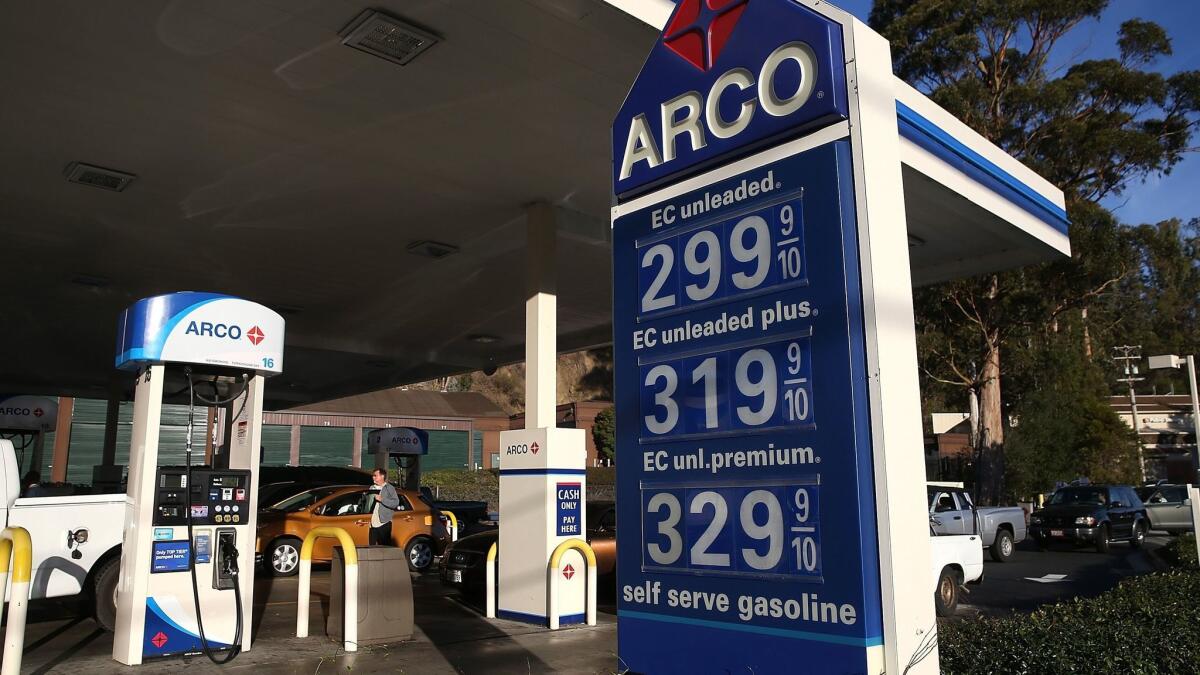Capitol Journal: California Republicans say raising gas taxes is a bad thing. GOP politicians in some red states donât agree

Reporting from In Sacramento â What do Republican politicians in many red states understand that the California GOP does not? Answer: That increasing gas taxes is good public policy and, potentially, winning politics.
Republicans in red states recently have accepted the uncomfortable truth that fuel taxes need to be raised to pay for repairing dilapidated highways and making life easier for motorists.
By contrast, Republican pols have been squawking about a California fuel tax hike enacted by Democrats â Gov. Jerry Brown and the Legislature â that will go into effect Wednesday. And California Republicans will soon start collecting signatures to qualify a 2018 ballot initiative to stop the tax.
That initiative would require all increases in fuel taxes and vehicle fees to be approved by voters, retroactive to Jan. 1 of this year. So that would include the new gas tax hike passed in April. It would be halted pending a statewide vote.
California Republicans are way out of sync with their GOP colleagues in other states.
Across the U.S., 26 states have raised fuel taxes to pay for road repairs in the last five years. And several are in states as bright red as California is deep blue.
Among those tax-hiking states, 18 have Republican governors. In 17, both legislative houses are controlled by Republicans. In fact, 13 states have complete one-party Republican rule in both the executive and legislative branches. President Trump carried 16 of the states in November.
After blue California passed its gas tax hike, three red states did also: South Carolina, Tennessee and Indiana.
In South Carolina, the tax increase was vetoed by GOP Gov. Henry McMaster. But the Republican Legislature overrode the veto while some GOP members denounced the governor for lack of leadership.
In Tennessee, which is completely controlled by Republicans, Gov. Bill Haslam pitched hard for the fuel tax and registration fee increases. To ease the pinch at the pump, Tennessee trimmed the sales tax on groceries. (California doesnât tax groceries.)
Other red states hiking fuel taxes include Georgia, Idaho, Iowa, Kentucky, South Dakota, Utah, West Virginia and Wisconsin.
Whatâs significant about these red states cozying up to gas tax hikes?
âIt serves as a dose of reality to counter a fairy tale spun by some suggesting Californiaâs action is part of a left-wing conspiracy hatched in âvery blueâ California,â Brian Kelly, secretary of the California State Transportation Agency, wrote in a Sacramento Bee op-ed article. âThe spin is pure fiction.
âThe reality is this. States are acting because the federal government has not touched the federal gas tax in nearly 25 years. The federal Highway Trust Fund is nearly insolventâŚ. While Washington sleeps, California has joined 25 other states to act.â
California Republicans have veered right over the decades while losing voters.
âWhen I was governor [in the 1970s], it was the Republicans who were beating down my door for a gas tax,â Brown told a legislative committee in April. âThey wanted to do 5 cents. I said, âNo, weâll let you have 2.â So the shoe is on the other foot now.â
Republicans back then were relevant. They were doing some things right. After Brown departed, Californians elected two consecutive Republican governors who served 16 years. But the GOP hasnât held any statewide office since 2010. And Democrats hold a supermajority in both legislative houses.
Before this year, the last governor to raise the gas tax was Republican George Deukmejian. That was in 1990. But it wasnât adjusted for inflation. So that tax now buys about half as much as it once did. Also, motorists are pumping fewer gallons because todayâs vehicles are more fuel-efficient.
Actually, the legislation will only return fuel taxes to essentially where they were a quarter century ago, adjusted for inflation.
On Nov. 1, the state tax will be raised 12 cents a gallon for gasoline and 20 cents for diesel. Then, on Jan. 1, thereâll be a new annual fee based on a vehicleâs worth, ranging from $25 to $175. And starting in 2020, thereâll be a $100 annual fee on electric cars because they escape gas taxes. The package will raise $5.2 billion a year.
Coverage of California politics Âť
âItâs extremely unpopular, especially with middle-class and lower-middle-class working Californians who have long commutes,â says Dave Gilliard, a veteran Republican consultant who is managing the initiative campaign. âIf we can qualify, the gas tax will go down to defeat.â
They need to collect 587,407 voter signatures.
A May poll by UC Berkeleyâs Institute of Governmental Studies confirmed the tax measureâs unpopularity. It was favored by only 35%, opposed by 58%.
That is whatâs driving the initiative and the GOPâs anti-gas tax fervor in California. The party needs a compelling issue to lure its voters to the polls next November. Itâs desperate to save seven threatened congressional seats and potentially GOP control of the House.
Since itâs highly unlikely thereâll be any attractive top-of-the-ticket candidates for governor or U.S. Senate to excite Republican voters, the party is counting on the gas tax.
âThe base vote needs some motivation,â Gilliard says.
One of the initiative bankrollers is Republican gubernatorial hopeful John Cox, a San Diego businessman.
âThese hikes hit the working poor particularly hard, forcing families to choose between gas in the tank to get to work, or rent or food on the table,â Cox wrote in a San Francisco Chronicle op-ed.
Republicans in red states must be shaking their heads, but not at the left coast Democrats.
Follow @LATimesSkelton on Twitter
ALSO
Was Gov. Brown wrong to make side deals to push through the gas tax hike? No, thatâs democracy
More to Read
Get the L.A. Times Politics newsletter
Deeply reported insights into legislation, politics and policy from Sacramento, Washington and beyond. In your inbox three times per week.
You may occasionally receive promotional content from the Los Angeles Times.











